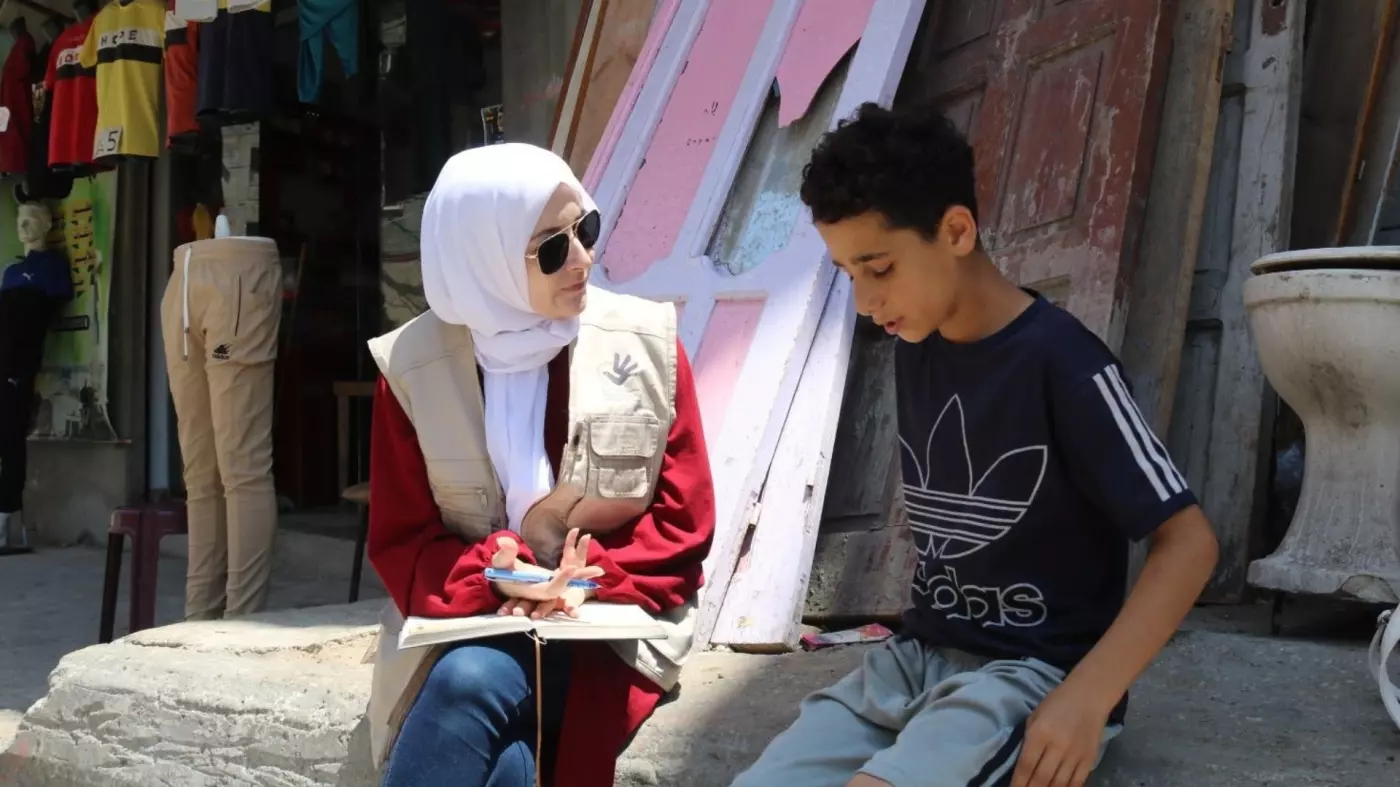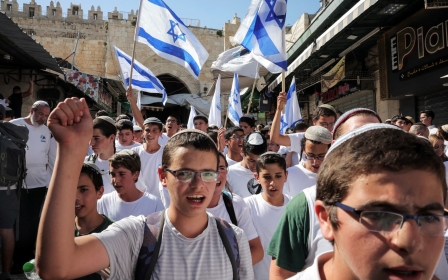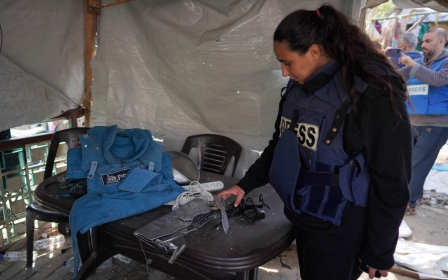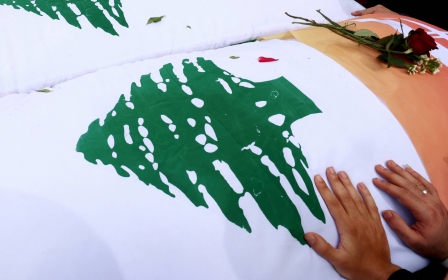Women's media foundation criticised for revoking Palestinian journalist's award
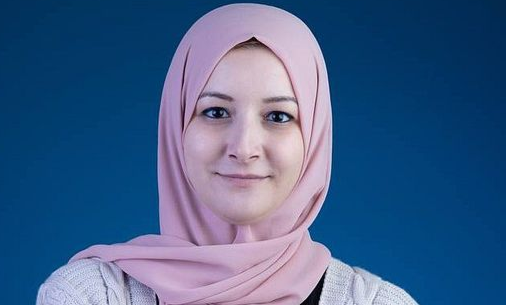
The International Women's Media Foundation (IWMF) has been condemned for withdrawing its Courage in Journalism Award from Palestinian journalist Maha Hussaini, who is reporting from the war-torn Gaza Strip.
Since Israel’s war on Gaza began in October, Hussaini has published dozens of stories with Middle East Eye, including a report uncovering Israeli field executions of Palestinians, which was used as evidence by South Africa at the International Court of Justice (ICJ) in its case accusing Israel of genocide.
The IWMF is a Washington-based foundation that describes itself as “a bold and inclusive organization that supports journalists where they are”, claiming its work “strengthens equal opportunity and press freedom worldwide”.
Its board and advisory council are made up of notable figures in the media, including former CNN journalist Suzanne Malveaux, the Washington Post’s Hannah Allam and TV anchor Christiane Amanpour. Its donors include the Bank of America, the Open Society Foundations and Luminate.
On 10 June, the IWMF announced that Hussaini was one of four recipients of its Courage in Journalism Awards, which it says honours remarkable bravery in the pursuit of reporting.
New MEE newsletter: Jerusalem Dispatch
Sign up to get the latest insights and analysis on Israel-Palestine, alongside Turkey Unpacked and other MEE newsletters
However, following allegations made by conservative US publication the Washington Free Beacon, the IWMF on Thursday said it was rescinding the award.
The Washington Free Beacon erroneously described Hussaini as a supporter of Hamas and an antisemite, citing social media posts commenting on the Israeli-Palestinian conflict and her own experience as a Palestinian woman trapped under Israeli occupation and siege in the Gaza Strip.
The IWMF said the comments “contradict the values” of the organisation.
“Both the Courage Awards and the IWMF’s mission are based on integrity and opposition to intolerance. We do not, and will not, condone or support views or statements that do not adhere to those principles,” it said in its statement.
That decision, made without consultation with Hussaini, has been condemned by Middle East Eye and the reporter herself, among others.
“Winning a prize for ‘courage’ means being subjected to attacks and choosing to continue your work regardless. However, I regret to say that the very organisation that recognised these perilous conditions and awarded me the prize succumbed to pressure and chose to act contrary to courage,” Hussaini said.
The Israeli military has killed at least 150 journalists in Gaza since the war began, according to local officials. The Committee to Protect Journalists (CPJ) has reported that it has been the deadliest period for journalists since the NGO began gathering data in 1992.
Since the 7 October Hamas-led attack on Israel and ensuing war on Gaza, more than 37,000 Palestinians have been killed by the Israeli military, mostly women and children.
The Israeli attacks have posed daily threats to Hussaini’s life, forced her to move location multiple times and to live in desperate conditions, along with almost all of Gaza’s 2.3m Palestinian population.
With the Israeli military accused of deliberately targeting Palestinian journalists and anyone with alleged or perceived links to Hamas, Hussaini said the IWMF decision had “put my life at risk”.
“Each announcement of an award to a Palestinian journalist is systematically followed by extensive smearing campaigns and intense pressure on the awarding organisations from supporters of the Israeli occupation,” she said.
“While some organisations uphold their principles and maintain their decision to honour these journalists, others, regrettably, cave to the pressure and withdraw the prizes.”
David Hearst, editor-in-chief of Middle East Eye, said: “The International Women's Media Foundation (IWMF) did not show much courage in rescinding the Courage in Journalism award to Maha Hussaini. On the front line of a war, such a designation is much more than an attempt to destroy Maha’s standing as an independent journalist.
"As a Palestinian whose house has been bombed and has been forced to flee for her life many times in the last eight months, it places her on an Israeli army target list. Over 150 journalists have been killed in this way. The IWMF should ask themselves where their responsibility as journalists lies.”
Award-winning independent investigative journalist Lila Hassan, a recipient of an IWMF grant, was among those sharply criticising the decision online.
“It is not up to this media organization or any western, detached person to determine how she or any Palestinian grapple with a brutal, violent occupation or watching their people live through what’s now an accused genocide, amid other crimes of humanity,” she posted on X, adding that the IWMF “fails its mission to uplift women”.
The Marie Colvin Journalists’ Network, which supports Arab women journalists, expressed its "full solidarity and support" for Hussaini.
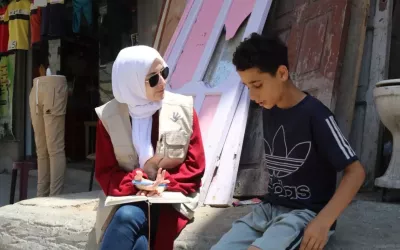
"We understand that Maha has been subject to a vicious campaign in which the Washington Free Beacon falsely accused her of supporting terrorism," it said.
"We are extremely disappointed that IWMF took this decision, and we remain concerned for Maha’s safety."
The IWMF has been asked for comment.
The Washington Free Beacon, launched in 2012 and backed by a significant Republican donor, was described by the Atlantic as "decadent and unethical" and has a history of targeting supporters of the Palestinian cause.
An article last month attacked the co-chair of Harvard University’s Islamophobia task force Ali Asani for signing a letter that endorsed the “Palestinian liberation struggle”.
Hussaini began work as a freelance journalist in July 2014 during the Israeli offensive on Gaza, producing, preparing, and presenting reports on the conflict that resulted in the deaths of more than 2,200 Palestinians and around 60 Israelis.
She has been writing for MEE since 2018 and has covered hundreds of stories focusing on human rights and armed conflict.
In 2020, she won the Martin Adler Prize, awarded by the prestigious Rory Peck Trust, for her reporting for MEE from Gaza.
Hussaini also works as the strategy director of the Geneva-based Euro-Mediterranean Human Rights Monitor.
Among Hussaini’s stories that were recognised by the IWMF is a report on the reality of women giving birth at home in Gaza and another featuring a girl who had to carry her paralysed six-year-old brother for miles while fleeing bombing.
“If winning a prize entails enduring and witnessing war crimes while remaining silent, I am not honoured to receive any prizes,” Hussaini said.
“I will always be objective in my reporting, but I can never be neutral; I will always point out the perpetrators and stand in solidarity with the victims. This is what journalism is truly about.”
Middle East Eye delivers independent and unrivalled coverage and analysis of the Middle East, North Africa and beyond. To learn more about republishing this content and the associated fees, please fill out this form. More about MEE can be found here.


